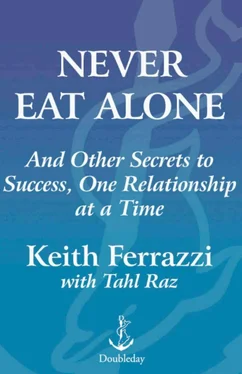Keith Ferrazzi - Never Eat Alone
Здесь есть возможность читать онлайн «Keith Ferrazzi - Never Eat Alone» весь текст электронной книги совершенно бесплатно (целиком полную версию без сокращений). В некоторых случаях можно слушать аудио, скачать через торрент в формате fb2 и присутствует краткое содержание. Год выпуска: 2005, ISBN: 2005, Издательство: C U R R E N C Y • D O U B L E D A Y, Жанр: marketing, на английском языке. Описание произведения, (предисловие) а так же отзывы посетителей доступны на портале библиотеки ЛибКат.
- Название:Never Eat Alone
- Автор:
- Издательство:C U R R E N C Y • D O U B L E D A Y
- Жанр:
- Год:2005
- ISBN:0-385-51529-4
- Рейтинг книги:4 / 5. Голосов: 1
-
Избранное:Добавить в избранное
- Отзывы:
-
Ваша оценка:
- 80
- 1
- 2
- 3
- 4
- 5
Never Eat Alone: краткое содержание, описание и аннотация
Предлагаем к чтению аннотацию, описание, краткое содержание или предисловие (зависит от того, что написал сам автор книги «Never Eat Alone»). Если вы не нашли необходимую информацию о книге — напишите в комментариях, мы постараемся отыскать её.
Never Eat Alone — читать онлайн бесплатно полную книгу (весь текст) целиком
Ниже представлен текст книги, разбитый по страницам. Система сохранения места последней прочитанной страницы, позволяет с удобством читать онлайн бесплатно книгу «Never Eat Alone», без необходимости каждый раз заново искать на чём Вы остановились. Поставьте закладку, и сможете в любой момент перейти на страницу, на которой закончили чтение.
Интервал:
Закладка:
Call it a clan, call it a network, call it a tribe, call it a family: Whatever you call it, whoever you are, you need one.
— JANE HOWARDAs a young man, I could relate to Groucho Marx. Like the famous comedian, I, too, had no interest in belonging to any club that would have me as a member.
It certainly wasn't because of some misplaced belief in selfsufficiency: I knew then how invaluable and rewarding a gathering of people could be. You wouldn't hear any angry grumblings out of my mouth about not having enough time. (That excuse kills me—what could be more important than meeting likeminded professionals?) And I certainly wasn't shy in large crowds.
It's just that all the clubs that seemed worth attending had their doors closed to a young, relatively unconnected man like me.
These clubs and conferences, with their selective memberships and aura of power, exist for good reason: People are always hungry to congregate with other people with similar interests, to make a difference in their communities, and to create an environment that makes it easier to do business. Big company CEOs realize that to make big things happen—whether it's public policy or a big deal with a public company—you need others. And the more connected, powerful, and resourceful these people are, the more you'll accomplish.
That's why the world's premier power and business gatherings, like the World Economic Forum in Davos and Renaissance Weekend, are such tough events to get into. At Renaissance Weekend, we've seen unknown politicians connect with the type of people that would lead them to become nationally known figures. At Davos, we've seen international policies formed and billion-dollar deals hatched over a cup of Swiss coffee. Of course, most of us can't get invited to Davos. But there are always gatherings and clubs to which we are not, at least initially, invited.
So you can't get into the big muckety-muck party tomorrow. Big deal. We all have the entrepreneurial spirit within us—if you can't play on a specific mountain, there's no reason not to build your own.
My friend Richard Wurman, an architect by trade, twenty years ago imagined how a convergence of technology, entertainment, and design was going to shake up the economy. "I was flying a lot, and I found that the only people who were interesting to talk to on airplanes were people in those three businesses," he has said on many an occasion. "And that when they were talking of a project they had passion about, they always included those other two professions." So to bring people in these fields together, he started the TED conference in 1984—with few attendees and his friends as guest speakers.
Opening every year with the same line, "Welcome to the dinner party I always wanted to have but couldn't," TED became the perfect event—a cross between a rollicking party and a mesmerizing graduate seminar. Year after year, more and more people came from all walks of life: scientists, authors, actors, CEOs, professors. At TED, it wouldn't be odd to see musician/producer Quincy Jones having a chat with Newscorp CEO Rupert Murdoch, or movie director Oliver Stone arguing with Oracle's founder and CEO Larry J. Ellison.
From money-losing get-together to exclusive confab, TED eventually took in upward of $3 million a year, almost all profit. Richard paid no speaker fees and organized the event with just a few assistants. He sold TED for $14 million in 2001, and is now busy running a new conference called TEDmed, about the convergence of technology and health, which I highly recommend.
I tried to do something similar when, as a fresh-faced MBA, I moved to Chicago after taking a job with Deloitte. I barely knew anyone in the city. The first thing I did was ask people to introduce me to their friends in Chicago. As I met with the people my friends had suggested, I began to inquire what boards I could join to get more involved in the life of the city. Doing so, I knew, would inevitably lead to increased business for my new company.
I was so young that no one really took me seriously. The traditional options, like the symphony board or country clubs, were not open to me. I had lots of offers to join the junior boards. But they were basically social groups. I wanted to be more of an activist, to make a real difference in the community. I didn't just want to host wine-tastings at a twenty-something dating mixer.
At a time like this, you have to figure out what is your U.S.P.— "unique selling proposition," for all you non-MBA types out there. What secret sauce can you bring to the table? Your proposition can be an expertise, a hobby, or even an interest or passion for a particular cause that will serve as the foundation from which an entire organization or club can be established.
All clubs are based on common interests. Members are united by a similar job, philosophy, hobby, neighborhood, or simply because they are the same race, religion, or generation. They are bound by a common proposition that is unique to them. They have, in other words, a reason to hang out together.
You can take your own distinctive proposition and then take the extra step that most people don't. Start an organization. And invite those you want to meet to join you. Gaining members will be easy. Like most clubs, it starts with your group of friends, who then select their own friends. Over time, those people will bring in even more new and intriguing people.
This is an enormously successful model that even thriving businesses have built upon. Think about the successful Internet sites that pooled people together around a common proposition—like political affiliation, gardening, or even, in the case of iVillage, being a woman—and built profitable enterprises on the feeling of belonging to that community. Think, also, of airline miles or your local grocery store where you get a discount for being a member of a loyalty program. Building a community of like-minded people around a common cause or interest is, and has always been, a very compelling proposition in its own right.
In those days, my proposition came from my personal interest in the popular business concept at the time called Total Quality Management (TQM), which, as I've described, formed the basis of my content that I used to differentiate myself at my first job out of Yale and then during a stint working with one of the professors at business school.
On a national level, the government had established an organization called the Baldrige National Quality Program that rewarded companies who exhibited excellence in TQM. In Illinois, I thought I could create a similar nonprofit organization for local companies. With a federal program already in the works, I figured it would not be too difficult to find others with a similar interest— judges and other members of the national organization who lived in Chicago, consultants, and employees of big corporations whose job it was to deal with TQM.
The first thing I needed to do was enlist the support of an institution or expert in TQM in order to attract other potential members. I asked the head of TQM for First Chicago, Aleta Belltetete, to join me as cofounder. She then pulled in her boss and one of the most influential CEOs in Chicago at the time, Dick Thomas, who gave us his blessing and agreed to adopt the initiative as one he personally supported. With Dick's backing, Governor Jim Edgar gladly assigned his Lieutenant Governor to our board. In landing the support of these three people, our start-up organization got a big dose of credibility. Soon a whole host of people was willing to be part of the enterprise, including the leaders of TQM at Amoco and Rush Presbyterian Hospital, who also brought their CEOs on board. The kicker: Because I had started the organization, I was president! Of course, now we had to create, run, and finance this enterprise. But the hard part was now done. We were a credible institution, and from here we all just rolled up our sleeves and got to the nitty-gritty work, which is also critical.
Читать дальшеИнтервал:
Закладка:
Похожие книги на «Never Eat Alone»
Представляем Вашему вниманию похожие книги на «Never Eat Alone» списком для выбора. Мы отобрали схожую по названию и смыслу литературу в надежде предоставить читателям больше вариантов отыскать новые, интересные, ещё непрочитанные произведения.
Обсуждение, отзывы о книге «Never Eat Alone» и просто собственные мнения читателей. Оставьте ваши комментарии, напишите, что Вы думаете о произведении, его смысле или главных героях. Укажите что конкретно понравилось, а что нет, и почему Вы так считаете.












